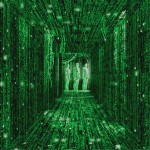 When I first saw The Matrix back in 1999, I instantly became fascinated with its “virtual reality world” concept. At the time, and for many years afterwards, I saw the theme as a metaphor for the illusionary material world we live in—a world of time, space, and the assumption that we are all separate individuals. My belief, in line with what I had taken from kabbalah, was that in reality, we were all one united energy force. Call it God, the light, Buddha, Allah, the universe, sentient energy, whatever. The point was that this energy created our illusionary world in order to experience itself. After all, since it was an all-knowing, all-powerful energy, existence was pretty boring. This energy wanted to experience the one thing it couldn’t know: what it was like to not be it. So, it created an imaginary world of time and space and separated itself there into different material elements that eventually evolved into human beings.
When I first saw The Matrix back in 1999, I instantly became fascinated with its “virtual reality world” concept. At the time, and for many years afterwards, I saw the theme as a metaphor for the illusionary material world we live in—a world of time, space, and the assumption that we are all separate individuals. My belief, in line with what I had taken from kabbalah, was that in reality, we were all one united energy force. Call it God, the light, Buddha, Allah, the universe, sentient energy, whatever. The point was that this energy created our illusionary world in order to experience itself. After all, since it was an all-knowing, all-powerful energy, existence was pretty boring. This energy wanted to experience the one thing it couldn’t know: what it was like to not be it. So, it created an imaginary world of time and space and separated itself there into different material elements that eventually evolved into human beings.
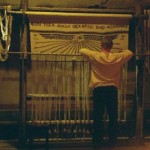 Just as how the Others blindly follow Jacob, we Lost fans have invested five years of our lives blindly following a TV show that has become increasingly intricate. Will our commitment be worth it in the end? Those of us who have faith have stuck with it, but we’ve lost a lot of former believers along the way. What if the series finale is a disappointment and leaves many of the major questions unanswered? Will we question our blind faith in a show that we hoped would give us answers to its convoluted storyline, and beyond? Hopefully we won’t get to that point, but I have some thoughts just in case we do.
Just as how the Others blindly follow Jacob, we Lost fans have invested five years of our lives blindly following a TV show that has become increasingly intricate. Will our commitment be worth it in the end? Those of us who have faith have stuck with it, but we’ve lost a lot of former believers along the way. What if the series finale is a disappointment and leaves many of the major questions unanswered? Will we question our blind faith in a show that we hoped would give us answers to its convoluted storyline, and beyond? Hopefully we won’t get to that point, but I have some thoughts just in case we do.
 Have you ever wondered what would happen if you could go back to a particular moment of your life and do something differently? What if you hadn’t taken a job you’d accepted, married someone you’d broken up with, said “no” when you’d previously said yes…or vice-versa? What if we were all allowed one do-over? Would your life be completely different than it is now, or would events have conspired to put you in pretty much the same place? By continuing to explore the concept of the variable, “Follow the Leader” brings up these very same questions, and if you’ve been paying attention, it’s already given us the answers.
Have you ever wondered what would happen if you could go back to a particular moment of your life and do something differently? What if you hadn’t taken a job you’d accepted, married someone you’d broken up with, said “no” when you’d previously said yes…or vice-versa? What if we were all allowed one do-over? Would your life be completely different than it is now, or would events have conspired to put you in pretty much the same place? By continuing to explore the concept of the variable, “Follow the Leader” brings up these very same questions, and if you’ve been paying attention, it’s already given us the answers.
 At the end of my last column, I asked whether the “variable” would prove to be an event that could change everything. The one thing that could have a domino effect on the outcomes of every event that followed. I wondered if this changeable event is what Ben and Widmore have been fighting for control of. After watching “The Variable,” I have to say “yes,” this is what the term is referring to. However, I’m still not so sure whether the variable will actually vary anything according to the mythology of the show.
At the end of my last column, I asked whether the “variable” would prove to be an event that could change everything. The one thing that could have a domino effect on the outcomes of every event that followed. I wondered if this changeable event is what Ben and Widmore have been fighting for control of. After watching “The Variable,” I have to say “yes,” this is what the term is referring to. However, I’m still not so sure whether the variable will actually vary anything according to the mythology of the show.
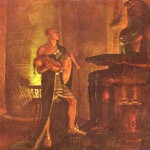 Perhaps the most ironic theme of “Dead Is Dead” is that it actually seems to imply anything but. The episode is more about the futility of death, rather than its finality, yet, I don’t think this is its ultimate message. The message in its fullest form is that dead is only dead if your services will no longer be needed.
Perhaps the most ironic theme of “Dead Is Dead” is that it actually seems to imply anything but. The episode is more about the futility of death, rather than its finality, yet, I don’t think this is its ultimate message. The message in its fullest form is that dead is only dead if your services will no longer be needed.
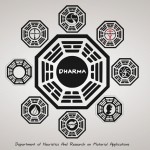 Before I go to sleep at night, sometimes I ask the universe a question about my destiny. The answer, as bizarre as it may seem, usually comes in the form of a song that wakes me up on my clock radio the next morning. While I haven’t done this in awhile, last night I once again had the urge. I asked the universe (God, the light, soul guides, my future self, whatever you wanna call it) what is going to happen on December 22, 2012—the day after the Mayan calendar abruptly ends. The answer I received really surprised me.
Before I go to sleep at night, sometimes I ask the universe a question about my destiny. The answer, as bizarre as it may seem, usually comes in the form of a song that wakes me up on my clock radio the next morning. While I haven’t done this in awhile, last night I once again had the urge. I asked the universe (God, the light, soul guides, my future self, whatever you wanna call it) what is going to happen on December 22, 2012—the day after the Mayan calendar abruptly ends. The answer I received really surprised me.
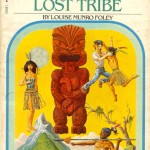 While most mythological stories explore at least one or two truths about the way our world works, Lost is unique in that it explores hundreds of them. It’s almost as if Lost is a spiritual guidebook to life. While I sometimes joke around about it, I’m beginning to truly believe that fans of the show will be better equipped to handle the strange new world we are going to inherit in the upcoming years. Whether consciously or subconsciously, it is almost as if Lost is training us to be able to mentally handle the future. The Good Book says that the meek shall inherit the earth. Perhaps it was referring to Lost geeks.
While most mythological stories explore at least one or two truths about the way our world works, Lost is unique in that it explores hundreds of them. It’s almost as if Lost is a spiritual guidebook to life. While I sometimes joke around about it, I’m beginning to truly believe that fans of the show will be better equipped to handle the strange new world we are going to inherit in the upcoming years. Whether consciously or subconsciously, it is almost as if Lost is training us to be able to mentally handle the future. The Good Book says that the meek shall inherit the earth. Perhaps it was referring to Lost geeks.
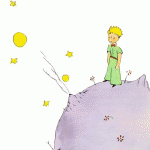 The Little Prince by Antoine De Saint-Exupéry is the first “grown-up” book I ever read. Which is ironic because it’s a children’s book about how we should never lose our sense of child-like wonder. Actually, the book is about a million different things and about absolutely nothing. While much of the mythology went over my head when I’d originally read the book as a kid, the story’s rich symbolism and metaphor made that fact pretty apparent. Even back then, I knew there was a lot going on in the book that I didn’t understand. I actually read the book again a few years ago after reading The Alchemist by Paulo Coelho because the story reminded me of it. I think I understand it a little better now, but will probably have to read it again in another 30 years or so. Something tells me that when I read it a final time as an old man, I will realize that I understood it the clearest when I was a kid. And that’s sort of the point.
The Little Prince by Antoine De Saint-Exupéry is the first “grown-up” book I ever read. Which is ironic because it’s a children’s book about how we should never lose our sense of child-like wonder. Actually, the book is about a million different things and about absolutely nothing. While much of the mythology went over my head when I’d originally read the book as a kid, the story’s rich symbolism and metaphor made that fact pretty apparent. Even back then, I knew there was a lot going on in the book that I didn’t understand. I actually read the book again a few years ago after reading The Alchemist by Paulo Coelho because the story reminded me of it. I think I understand it a little better now, but will probably have to read it again in another 30 years or so. Something tells me that when I read it a final time as an old man, I will realize that I understood it the clearest when I was a kid. And that’s sort of the point.
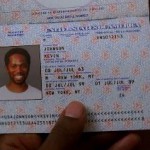 The first thing that stuck me as interesting in this episode was Michael, a.k.a., Kevin Johnson, responding to Sayid’s question about what he was doing there by saying that he was there to die. After watching the full episode, we may assume that he was referring to his repeated attempts at suicide, but if “The Myth of Lost” simulation theory is correct, Michael may be talking about something else—his desire to die and get out of the simulation already.
The first thing that stuck me as interesting in this episode was Michael, a.k.a., Kevin Johnson, responding to Sayid’s question about what he was doing there by saying that he was there to die. After watching the full episode, we may assume that he was referring to his repeated attempts at suicide, but if “The Myth of Lost” simulation theory is correct, Michael may be talking about something else—his desire to die and get out of the simulation already.
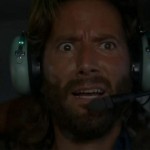 Besides being vastly intriguing, another reason I love “The Constant” is because it gets back to the mythology that’s been mostly missing this season. In this episode, we see that Desmond’s mind is moving back and forth between his life in and around the island, and his life in the so-called real world. Even though he’s not on the island during the time-jumps, he’s still apart of it. He may even still be in the simulation. In The Myth of Lost, I mention how the Portuguese guys who contact Penny from some frigid region are also within the simulation—just another part of it. Similarly, it is entirely possible that Desmond is still in the simulation, but only the area in and around the island is affected by the glitch. As Desmond crossed through the infected area of the simulation, it may have infected him, bringing about the time-jumps in his consciousness as his mind is hooked up to the program.
Besides being vastly intriguing, another reason I love “The Constant” is because it gets back to the mythology that’s been mostly missing this season. In this episode, we see that Desmond’s mind is moving back and forth between his life in and around the island, and his life in the so-called real world. Even though he’s not on the island during the time-jumps, he’s still apart of it. He may even still be in the simulation. In The Myth of Lost, I mention how the Portuguese guys who contact Penny from some frigid region are also within the simulation—just another part of it. Similarly, it is entirely possible that Desmond is still in the simulation, but only the area in and around the island is affected by the glitch. As Desmond crossed through the infected area of the simulation, it may have infected him, bringing about the time-jumps in his consciousness as his mind is hooked up to the program.
 When I first saw The Matrix back in 1999, I instantly became fascinated with its “virtual reality world” concept. At the time, and for many years afterwards, I saw the theme as a metaphor for the illusionary material world we live in—a world of time, space, and the assumption that we are all separate individuals. My belief, in line with what I had taken from kabbalah, was that in reality, we were all one united energy force. Call it God, the light, Buddha, Allah, the universe, sentient energy, whatever. The point was that this energy created our illusionary world in order to experience itself. After all, since it was an all-knowing, all-powerful energy, existence was pretty boring. This energy wanted to experience the one thing it couldn’t know: what it was like to not be it. So, it created an imaginary world of time and space and separated itself there into different material elements that eventually evolved into human beings.
When I first saw The Matrix back in 1999, I instantly became fascinated with its “virtual reality world” concept. At the time, and for many years afterwards, I saw the theme as a metaphor for the illusionary material world we live in—a world of time, space, and the assumption that we are all separate individuals. My belief, in line with what I had taken from kabbalah, was that in reality, we were all one united energy force. Call it God, the light, Buddha, Allah, the universe, sentient energy, whatever. The point was that this energy created our illusionary world in order to experience itself. After all, since it was an all-knowing, all-powerful energy, existence was pretty boring. This energy wanted to experience the one thing it couldn’t know: what it was like to not be it. So, it created an imaginary world of time and space and separated itself there into different material elements that eventually evolved into human beings. Just as how the Others blindly follow Jacob, we Lost fans have invested five years of our lives blindly following a TV show that has become increasingly intricate. Will our commitment be worth it in the end? Those of us who have faith have stuck with it, but we’ve lost a lot of former believers along the way. What if the series finale is a disappointment and leaves many of the major questions unanswered? Will we question our blind faith in a show that we hoped would give us answers to its convoluted storyline, and beyond? Hopefully we won’t get to that point, but I have some thoughts just in case we do.
Just as how the Others blindly follow Jacob, we Lost fans have invested five years of our lives blindly following a TV show that has become increasingly intricate. Will our commitment be worth it in the end? Those of us who have faith have stuck with it, but we’ve lost a lot of former believers along the way. What if the series finale is a disappointment and leaves many of the major questions unanswered? Will we question our blind faith in a show that we hoped would give us answers to its convoluted storyline, and beyond? Hopefully we won’t get to that point, but I have some thoughts just in case we do. Have you ever wondered what would happen if you could go back to a particular moment of your life and do something differently? What if you hadn’t taken a job you’d accepted, married someone you’d broken up with, said “no” when you’d previously said yes…or vice-versa? What if we were all allowed one do-over? Would your life be completely different than it is now, or would events have conspired to put you in pretty much the same place? By continuing to explore the concept of the variable, “Follow the Leader” brings up these very same questions, and if you’ve been paying attention, it’s already given us the answers.
Have you ever wondered what would happen if you could go back to a particular moment of your life and do something differently? What if you hadn’t taken a job you’d accepted, married someone you’d broken up with, said “no” when you’d previously said yes…or vice-versa? What if we were all allowed one do-over? Would your life be completely different than it is now, or would events have conspired to put you in pretty much the same place? By continuing to explore the concept of the variable, “Follow the Leader” brings up these very same questions, and if you’ve been paying attention, it’s already given us the answers. At the end of my last column, I asked whether the “variable” would prove to be an event that could change everything. The one thing that could have a domino effect on the outcomes of every event that followed. I wondered if this changeable event is what Ben and Widmore have been fighting for control of. After watching “The Variable,” I have to say “yes,” this is what the term is referring to. However, I’m still not so sure whether the variable will actually vary anything according to the mythology of the show.
At the end of my last column, I asked whether the “variable” would prove to be an event that could change everything. The one thing that could have a domino effect on the outcomes of every event that followed. I wondered if this changeable event is what Ben and Widmore have been fighting for control of. After watching “The Variable,” I have to say “yes,” this is what the term is referring to. However, I’m still not so sure whether the variable will actually vary anything according to the mythology of the show. Perhaps the most ironic theme of “Dead Is Dead” is that it actually seems to imply anything but. The episode is more about the futility of death, rather than its finality, yet, I don’t think this is its ultimate message. The message in its fullest form is that dead is only dead if your services will no longer be needed.
Perhaps the most ironic theme of “Dead Is Dead” is that it actually seems to imply anything but. The episode is more about the futility of death, rather than its finality, yet, I don’t think this is its ultimate message. The message in its fullest form is that dead is only dead if your services will no longer be needed. Before I go to sleep at night, sometimes I ask the universe a question about my destiny. The answer, as bizarre as it may seem, usually comes in the form of a song that wakes me up on my clock radio the next morning. While I haven’t done this in awhile, last night I once again had the urge. I asked the universe (God, the light, soul guides, my future self, whatever you wanna call it) what is going to happen on December 22, 2012—the day after the Mayan calendar abruptly ends. The answer I received really surprised me.
Before I go to sleep at night, sometimes I ask the universe a question about my destiny. The answer, as bizarre as it may seem, usually comes in the form of a song that wakes me up on my clock radio the next morning. While I haven’t done this in awhile, last night I once again had the urge. I asked the universe (God, the light, soul guides, my future self, whatever you wanna call it) what is going to happen on December 22, 2012—the day after the Mayan calendar abruptly ends. The answer I received really surprised me. While most mythological stories explore at least one or two truths about the way our world works, Lost is unique in that it explores hundreds of them. It’s almost as if Lost is a spiritual guidebook to life. While I sometimes joke around about it, I’m beginning to truly believe that fans of the show will be better equipped to handle the strange new world we are going to inherit in the upcoming years. Whether consciously or subconsciously, it is almost as if Lost is training us to be able to mentally handle the future. The Good Book says that the meek shall inherit the earth. Perhaps it was referring to Lost geeks.
While most mythological stories explore at least one or two truths about the way our world works, Lost is unique in that it explores hundreds of them. It’s almost as if Lost is a spiritual guidebook to life. While I sometimes joke around about it, I’m beginning to truly believe that fans of the show will be better equipped to handle the strange new world we are going to inherit in the upcoming years. Whether consciously or subconsciously, it is almost as if Lost is training us to be able to mentally handle the future. The Good Book says that the meek shall inherit the earth. Perhaps it was referring to Lost geeks. The Little Prince by Antoine De Saint-Exupéry is the first “grown-up” book I ever read. Which is ironic because it’s a children’s book about how we should never lose our sense of child-like wonder. Actually, the book is about a million different things and about absolutely nothing. While much of the mythology went over my head when I’d originally read the book as a kid, the story’s rich symbolism and metaphor made that fact pretty apparent. Even back then, I knew there was a lot going on in the book that I didn’t understand. I actually read the book again a few years ago after reading The Alchemist by Paulo Coelho because the story reminded me of it. I think I understand it a little better now, but will probably have to read it again in another 30 years or so. Something tells me that when I read it a final time as an old man, I will realize that I understood it the clearest when I was a kid. And that’s sort of the point.
The Little Prince by Antoine De Saint-Exupéry is the first “grown-up” book I ever read. Which is ironic because it’s a children’s book about how we should never lose our sense of child-like wonder. Actually, the book is about a million different things and about absolutely nothing. While much of the mythology went over my head when I’d originally read the book as a kid, the story’s rich symbolism and metaphor made that fact pretty apparent. Even back then, I knew there was a lot going on in the book that I didn’t understand. I actually read the book again a few years ago after reading The Alchemist by Paulo Coelho because the story reminded me of it. I think I understand it a little better now, but will probably have to read it again in another 30 years or so. Something tells me that when I read it a final time as an old man, I will realize that I understood it the clearest when I was a kid. And that’s sort of the point.


